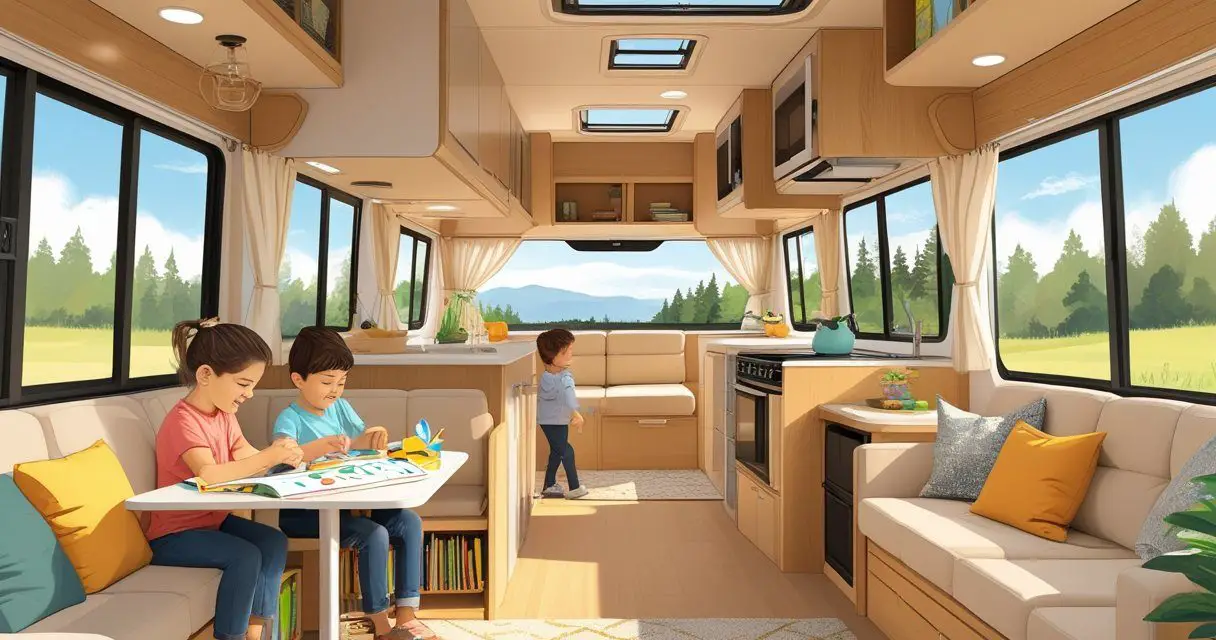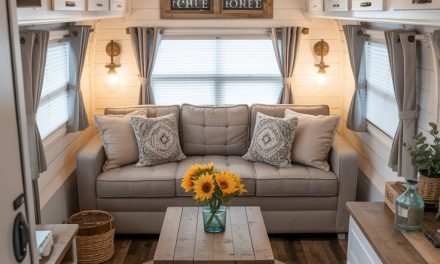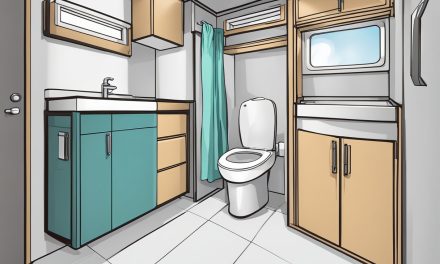Living full-time in an RV with kids might sound unusual, but it’s more common than you think. Families across the country choose this lifestyle for flexibility, affordability, and the chance to spend more time together.
Yes, kids can live in an RV as long as their basic needs for safety, health, and education are met.
You’ll need to think about where you can legally park, how to handle school requirements, and what daily life looks like in a smaller space. Some areas have stricter rules than others, and you may need to provide proof of residency for school or use homeschooling options.
Key Takeaways
- Kids can live in an RV if their basic needs are met
- Schooling and healthcare must be planned carefully
- Family life in an RV requires balancing benefits and challenges
Is It Legal for Kids to Live in an RV?
Living in an RV with children is legal, but you must follow rules that vary by state, county, and city. The main issues involve where you park, how you establish residency, and whether your child’s basic needs for safety, education, and health are being met.
State and Local Laws
No state law directly bans you from living in an RV with your child. What matters is whether you meet state requirements for education, medical care, and general welfare.
For example, you must still enroll your child in school or follow homeschooling rules. Each state sets its own standards.
Some require regular assessments or progress reports if you homeschool. Vaccination records are also necessary for public school enrollment.
Residency plays a role in school access. Many districts accept alternative documents like RV park leases, utility bills, or affidavits if you lack a fixed address.
Some states also require you to establish a legal domicile for taxes, voting, and benefits.
Failing to meet these requirements can cause problems with local authorities, even if your RV is safe and well-maintained.
Zoning and Residency Requirements
Zoning laws decide where you can legally live in your RV. In many cities, you cannot use an RV as a permanent home outside of approved parks or campgrounds.
These areas are zoned for temporary stays and often limit how long you can remain. Rural areas may be more flexible, but you still may need a permit or variance.
Some counties allow long-term RV living if you meet sanitation and utility standards, such as proper sewage hookups and safe electrical connections.
Common restrictions include:
- Maximum stay limits (30–90 days in some parks)
- Requirements for water, sewer, and electricity hookups
- Prohibitions on permanent RV residency in residential neighborhoods
If you ignore zoning rules, you may face fines, eviction, or denial of services like school enrollment.
Child Protective Services Oversight
Child Protective Services (CPS) does not remove children simply because they live in an RV. The concern is whether your child has safe shelter, food, healthcare, and access to education.
CPS may investigate if someone reports unsafe conditions. A typical review looks at whether your RV has running water, working electricity, proper sanitation, and enough space for your child to live safely.
If you fail to meet these standards, CPS could intervene. However, many families live in RVs without issue as long as they maintain basic living conditions and keep up with school and healthcare requirements.
Keeping documentation such as medical records, school enrollment papers, and proof of residency helps show compliance if questions arise.
Meeting Basic Needs for Children in an RV
When living in an RV with a child, you must ensure their health, safety, and daily care are not compromised. This includes creating a secure environment, maintaining proper sanitation, and ensuring steady access to food and clean water.
Safety and Health Considerations
Your RV should provide a safe space for your child just as a traditional home would. Install working smoke detectors, carbon monoxide alarms, and fire extinguishers.
Keep exits clear and make sure your child knows how to leave the RV in an emergency. Medical care is another key factor.
You need a plan for routine checkups, vaccinations, and urgent care access. If you travel often, keep a list of nearby clinics or hospitals in each area.
Supervision is especially important in small spaces. Secure cabinets with cleaning supplies, medicines, or tools.
Use baby gates or barriers if you have younger children to keep them away from hazardous areas like the kitchen or driver’s seat. Finally, keep your RV well-ventilated and temperature-controlled.
Children are more sensitive to extreme heat or cold, so use fans, heaters, or air conditioning to maintain safe conditions.
Sanitation and Utilities
Proper sanitation is essential when raising children in an RV. You need reliable systems for waste disposal, water supply, and electricity.
Most campgrounds provide hookups, but if you boondock, you must manage tanks and power carefully. Greywater and blackwater tanks should be emptied at approved dumping stations.
Failing to do so can create health risks and legal issues. Always carry gloves and disinfectants when handling waste.
Access to clean water is non-negotiable. Test your supply if you fill from unfamiliar sources.
Consider using a water filtration system to make sure drinking water is safe. Electricity supports daily needs like refrigeration, lighting, and heating.
Many families use a mix of campground hookups, generators, and solar panels. Whatever system you choose, make sure it can handle essential appliances without frequent outages.
Access to Food and Water
Children need consistent meals and hydration, which can be harder in a small RV kitchen. Plan meals that use limited storage and cooking space.
Shelf-stable foods, fresh produce, and frozen items can all be part of your rotation. A reliable refrigerator is critical.
If space is limited, shop more often in smaller amounts. Keep snacks like fruit, granola bars, and cheese sticks handy for quick access.
Clean drinking water is just as important as food. Store extra gallons in case hookups are unavailable.
Many families also use refillable jugs or portable filters when traveling between campgrounds. Eating together at a small table or outdoors can help maintain routines.
Consistent meal times support stability for your child, even while moving from place to place.
Education Options for Kids Living in an RV
When you live in an RV with a child, you need to plan carefully for their schooling. Access to public schools, homeschooling rules, and keeping proper records all play a role in making sure your child stays on track academically.
Public School Enrollment Challenges
Enrolling your child in a traditional public school while living in an RV can be difficult. Schools usually require proof of residency, such as a utility bill or lease, which you may not have if you move often.
Some districts may not accept an RV park address as a valid residence. If you plan to stay in one location for several months, you may be able to use the RV park address or a relative’s home address for enrollment.
However, frequent moving makes this harder and may disrupt your child’s education. Transportation is another issue.
School buses may not serve RV parks or campgrounds, which means you would need to arrange your own drop-off and pick-up. This can be inconvenient if you are traveling or working during school hours.
Because of these challenges, many families turn to homeschooling or online programs as more flexible options.
Homeschooling and Online Learning
Homeschooling is legal in all 50 states, but the rules vary. Some states require you to file paperwork, submit lesson plans, or keep attendance records.
Others, like Texas or Idaho, have almost no requirements. You must follow the laws of your state of residency, even if you travel across the country.
Online learning programs give you structure and flexibility. Options include state-approved virtual schools, charter school programs, or independent online curricula.
Many families also use free resources such as Khan Academy or low-cost subscription programs. A benefit of homeschooling in an RV is the chance to use travel as part of your lessons.
Museums, national parks, and historical sites can all serve as learning opportunities. This approach is often called roadschooling.
To stay organized, set a daily routine and create a dedicated learning space, even if it’s just the kitchen table or an outdoor setup with a folding table and chairs.
Maintaining Academic Records
Keeping accurate records is important when your child is homeschooled or enrolled in an online program. These records may be needed if you re-enroll in a traditional school, apply to colleges, or meet state reporting requirements.
Would you like to save this article?
You should track:
- Attendance (days and hours of instruction)
- Subjects and curriculum used
- Grades or progress reports
- Samples of work (essays, projects, tests)
Many parents keep digital files on a laptop or cloud storage for easy access. Others use binders or folders to store physical copies.
If you use a state-approved online school, the program usually provides official transcripts. If you homeschool independently, you may need to create your own transcript when your child reaches high school.
Maintaining detailed records not only keeps you compliant with state laws but also ensures your child’s education is recognized if you change schooling methods later.
Family Life and Socialization on the Road
Living in an RV with kids requires balancing small spaces, creating chances for friendships, and finding ways to give everyone privacy. Daily routines look different than in a traditional home, but with planning, your family can adapt and thrive.
Adjusting to Limited Space
When you live in an RV, every inch of space matters. Kids often share bunks or small sleeping areas, which can feel crowded at first.
You may need to downsize belongings, keeping only items that serve a clear purpose. One way to make the space work is to give each child a personal area, even if it’s just a shelf, drawer, or bin.
This helps them feel ownership over their things. Cleaning and organizing become part of daily life.
With less space, clutter builds quickly, so simple routines like putting toys away right after use keep the RV comfortable. Families often find benefits in the small space too.
Less room means less to clean, and kids spend more time outside playing, exploring, and learning.
Building Community and Friendships
Socialization is one of the biggest concerns when raising kids on the road. Your children may miss consistent friendships, but RV living gives them unique chances to meet new people in campgrounds, parks, and local activities.
Many RV parks host kid-friendly events like crafts, sports, or group hikes. These activities help children connect with others their age.
Programs such as the Junior Ranger activities at national parks also give kids structured ways to learn and make friends. Technology can help maintain friendships.
Exchanging phone numbers, video calls, or online groups allow your kids to stay in touch with friends they meet along the way. Some families also join RV clubs or attend rallies where kids meet other traveling families.
These networks create a sense of community and help kids feel less isolated.
Privacy for Children and Parents
Privacy is limited when you live in an RV, but it’s still possible to create boundaries. Curtains, room dividers, or even simple rules about quiet time can give kids and parents personal space.
Parents often use outdoor areas as an extension of their home. Setting up chairs, hammocks, or a small tent can provide a private escape when the RV feels too close.
For children, having a small personal corner helps. Let them decorate with favorite colors, bedding, or hobbies so the space feels like their own.
It’s also important to respect each other’s need for downtime. Even in a small space, setting expectations about privacy helps reduce conflict and makes RV living more comfortable for everyone.
Financial and Practical Considerations
Living in an RV with kids requires careful planning to manage costs, protect your family with the right insurance, and meet state rules about taxes and residency. These factors directly affect your stability and ability to keep the lifestyle sustainable.
Budgeting for RV Living
You need to plan for both fixed and variable expenses. Fixed costs often include RV payments, campground fees, and insurance premiums.
Variable costs include fuel, groceries, maintenance, and activity expenses for your kids.
Campground or RV park fees can range from $500–$1,200 per month depending on location and amenities. Boondocking (camping without hookups) may lower costs but requires investments in solar panels, generators, or larger water tanks.
Fuel is another major expense. The size of your RV and how often you travel directly affect gas costs.
Many families reduce expenses by traveling fewer miles each month and staying longer in one place.
It helps to track spending with a simple spreadsheet or budgeting app. Listing out categories like fuel, food, utilities, and repairs gives you a clear picture of where money goes and where you can cut back.
Insurance and Liability
RV insurance is not optional. You must carry at least the state’s minimum liability coverage for the vehicle.
Full-time RV living usually requires a more comprehensive policy that combines auto and homeowner-style coverage.
A full-time policy often includes:
- Liability coverage (injuries or damage to others)
- Personal property coverage (belongings inside the RV)
- Emergency expense coverage (hotel stays if your RV becomes unusable)
You should also maintain safety equipment like fire extinguishers, smoke detectors, and carbon monoxide alarms. Insurers may deny claims if your RV is poorly maintained or unsafe.
If you plan to stay in private campgrounds, be aware that many require proof of insurance. This protects both you and the park in case of accidents or damage.
Tax Implications and Legal Residency
You need a legal domicile to establish residency for taxes, voting, and school enrollment. Many full-time RV families choose states like Texas, Florida, or South Dakota because they have no state income tax and flexible residency rules.
Establishing residency usually requires:
- A mailing address (often through a mail forwarding service)
- Vehicle registration in the state
- A driver’s license from that state
Tax obligations depend on your chosen domicile. If you fail to establish one, you may face penalties or lose access to state services like healthcare or education.
Consulting a tax advisor familiar with RV living can help you stay compliant.
Residency also affects things like homeschool reporting requirements, jury duty, and insurance rates. Choosing the right state is an important financial and practical decision.
Pros and Cons of Raising Kids in an RV
Living in an RV with a child can give your family more time together and new experiences. It also comes with limits on space, privacy, and stability.
You need to weigh the benefits of freedom and connection against the challenges of small living and constant change.
Benefits of RV Family Life
One of the biggest advantages is time together. You see your kids grow, explore, and face new challenges daily.
Instead of rushing through routines, you often share meals, outdoor activities, and travel experiences side by side.
Travel also exposes your children to many environments. They might play by the beach one week and hike in the mountains the next.
This variety helps them learn flexibility and see different ways of life across the country.
RV parks, campgrounds, and state parks often have built-in social opportunities like playgrounds, pools, or group activities. Your kids may make friends quickly and learn how to adapt to new groups.
You also teach them to live with less. With limited storage, children learn to value experiences over things.
Many families find this simpler lifestyle reduces stress and creates more focus on shared activities.
Challenges Unique to RV Living with Children
The most obvious drawback is lack of space. With everyone in close quarters, privacy is limited.
You may miss having separate rooms. Kids may need to find small personal spaces outside or in bunks.
Noise is another factor. Kids are naturally loud, and RV walls are thin.
Balancing respect for neighbors while letting children be themselves can be tricky.
You also face logistical issues. Some campgrounds charge extra fees per child, and not all places welcome families.
Internet and cell service can be unreliable, making schoolwork or remote work harder.
Daily routines like laundry, cooking, and showers take more planning. Hot water runs out quickly, counter space is small, and storage for toys or school supplies is limited.
Frequent moves can disrupt friendships and routines. Some children may find it harder to adjust to constant change compared to a more settled lifestyle.







